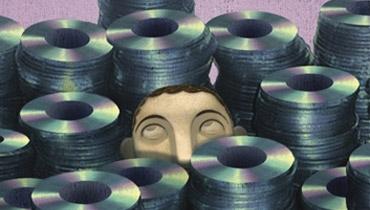Serving Up DVDs

Whether your music arrives via ripping, streaming, or downloading, it's not difficult to see that hard drives have won the music-storage battle - and it's easy to see why. Once music has been rejiggered into handy data files, so much more can be done with it beyond being able to carry 10,000 songs in your pocket. For that reason, and many more, digital content delivery has been an incredible boon to audio enthusiasts and custom installers alike.
But when it comes to movie watching, things are pretty much the same as they ever were. While CD sales are tanking, people continue to snap up DVDs every Tuesday when the new releases roll out.
Most of us manage our movie collections by placing the discs on shelves or in a megachanger. With shelves - or a cabinet or rack - you browse through your collection one disc at a time whenever you want to watch a movie. This approach can make it hard to explore your collection, especially if you just want to quickly find a disc so you can check out a favorite scene.
The other common option is to get a megachanger that can hold all of your DVDs. Of course, throwing your discs together into gen-pop can be like giving them a life sentence without the possibility of a "now playing" parole. Because unless you're Rain Man or happen to have a spreadsheet of your DVD library handy at all times, it can be hard to remember which disc is in Slot 1, let alone Slot 286. An excellent solution is to get a DVD manager from a company like Escient or ReQuest. These megachanger add-ons automatically look up, catalog, and sort your movies for easy browsing. But they're slow, taking 30 or more seconds to load a title. And while one disc is playing, the other 399 stay locked up, unusable.
None of these solutions can do anything about a disc's biggest shortcoming: If it ain't there, you can't play it. Now that I have a young daughter, I know that her favorite disc - her current No. 1 is They Might Be Giants' Here Come the 123s - will go with us whenever we travel. And whether it moves into a laptop, a portable player, or a Yukon, every time that disc leaves the sanctity of the changer, there's a good chance it will get scratched.
Using a hard-drive-based server solves all of these problems. Collections are automatically cataloged by title and genre and easily managed, and you can jump almost instantly between scenes or even movies. Also, once a disc has been ripped, you don't need it anymore. And because it's data, simultaneously playing multiple movies from your collection is a breeze.
Sadly, video servers haven't caught on as ferociously as their music counterparts. Whether you chock it up to Hollywood's over-protectiveness, the DVD's Copy Control Association (CCA), the Digital Millennium Copyright Act (DMCA), or opportunistic lawyers, the fact remains that movie delivery is languishing in the past.
That's not to say there aren't any video servers. The best known is Kaleidescape, and while I'm an unabashed fan, the $13,980 cost of an entry-level Kaleidescape system puts it outside the realm of affordability for 99% of the population, myself included.
Kaleidescape was taken to court for violating the CCA, but a ruling was handed down in the company's favor last year. It wasn't exactly a landslide victory, though, and the CCA is appealing it. Many industry insiders were hoping that a decisive ruling would pave the way for similar systems, likely at more reasonable prices. But video servers continue to exist on a slippery legal slope that has kept many companies sitting on the sidelines.
Some manufacturers sell systems that include everything but the software you need to actually import copyrighted discs. One company's Web site offers this pearl of wisdom: "Users are free to download DVD decryption utility software at such time as they feel the legal environment in their jurisdiction permits such activity." This "wink/wink," get-the-software-yourself technicality has yet to be challenged in court.
Fortunately, Blu-ray Disc offers a glimmer of hope here, thanks to its Mandatory Managed Copy. This lets you make a digital copy of any discs you buy so they can then be streamed around the house or loaded into a portable player. But with dual-layer Blu-ray Discs clocking in at 50 gigabytes, storing a library of HD films chews up hard-drive space like never before. Of course, with terabyte drives dropping in price daily, movie lovers won't have much trouble solving that problem.













































